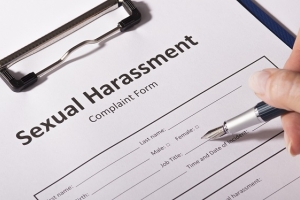Should state representatives be held accountable if they don’t sign the House policy on sexual harassment?

The New Hampshire House and Senate have a written policy on sexual harassment, as well as other forms of harassment and discrimination. The policy describes different behaviors that constitute harassment, such as unwelcome advances or requests for sexual favors, and asserts that they will not be tolerated.
At the start of each legislative session, lawmakers are asked to acknowledge the policy with their signatures.
House and Senate representatives are also meant to undergo sexual harassment prevention training during the opening days of their orientation. That training hasn't been a part of orientation in recent years.
Some reps haven't signed the policy
This year, all 24 current members of the N.H. Senate signed the policy. However, in the House, only 280 of the 400 representatives returned the signed form.
The policy has no provision -- reprimand, sanction, or other action -- to discipline lawmakers who do not sign the acknowledgement form, either because they forgot to or they refuse to.
“I can’t force these guys to do anything,” said House Chief of Staff Terry Pfaff.
In contrast, earlier this month in Illinois, a bill was passed that requires all lawmakers to undergo sexual harassment training within thirty days of taking their seat. Those who fail to do so will have their names released to the public.
Should lawmakers be sanctioned for not signing?
Some lawmakers say forcing them to sign a sexual harassment policy is a violation of their rights.
“I do not accept, agree with or acknowledge this policy. I further invoke all 1st amendment and constitutional protections which this policy may be violating."
- Rep. Dan Hynes
State Rep. Laurie Sanborn, a candidate for House speaker, doesn’t see harassment as a big issue. “We have a nice atmosphere at the Statehouse,” she said.
But state Rep. Debra Altschiller argues the policy needs to be acknowledged by every member.
“There is a culture of implicit bias, no doubt about it. And there is also a culture of deniability,” she said.
What do you think? Should all lawmakers be required to sign the sexual harassment policy, and face disciplinary action if they neglect to or refuse?
Let us know what you think by leaving a comment—yes or no, and why—in the space below.











Comments
Login or register to post comments